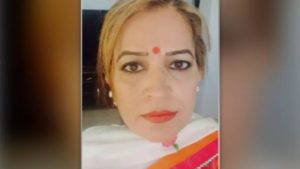It’s time to stand up to domestic violence
 Parwinder Kaur, killed in 2013,
Parwinder Kaur, killed in 2013,
By Nitasha Bhatia
Tasmin Bahar who had recently separated from Dave Pillay, her partner of six years, told relatives she was starting to get her life back on track. On Father’s Day, she took her three-year-old daughter to spend time with her dad. However, the decision to visit her former partner’s house ultimately proved fatal. Tasmin and her partner Dave were both found dead in the bathroom, according to police, Tasmin by strangulation and Pillay who hung himself.
Another case in March of last year is of Manjinder Ghuman, a beloved member of the Gordonvale community just north of Cairns. Her husband, Balwinder Ghuman, allegedly stabbed her to death in a fit of rage after an argument over his heavy drinking habit. He is also alleged to have stabbed his father-in-law who came in aid of his daughter.
In Australia, women are three times more likely than men to experience domestic assault inflicted by an intimate partner.
And, on average, a woman will endure thirty-five assaults before she makes her first complaint.
The cases of Tasmin and Manjinder were no different, with both women enduring a history of physical and emotional abuse at the hands of their partners. Why did the victims choose to endure this abuse?
Why do countless other women stay in similar abusive relationships?
Amrit Varsha, a community educator on the issue of domestic and family violence from Granville TAFE says in most domestic violence incidents “women will make multiple attempts to leave before they finally decide to leave for good. They fall prey to perpetrators who use a planned, systematic approach to erode their confidence, independence and social networks. Eventually the women lose their ability and confidence to make decisions for themselves and continue to live with the abuse”.
Tasmin Bahar, dead.
For Indian migrant women the issue of domestic violence is even more complex. Issues like language barriers, lack of family support and a limited knowledge of Australian laws make leaving an abusive relationship much more difficult.
Amrit says, “Traditionally, Indian women have relied solely on immediate and extended family for support on family relationship issues. If that fails, they will seek support from close friends. They are not accustomed to seeking help from an external Western System available through a range government funded services.” Essentially, migrant women find themselves isolated and vulnerable making it difficult to escape an abusive situation.
The desire to ”˜control’ one’s partner appears to be the common thread amongst most domestic violence incidents. In many cases, control is not only exercised through physical violence but also emotional, sexual, psychological and financial abuse.
A notable display of dominance and control was evident in the case of Nikita Chawla, a 23-year-old aspiring dancer who was murdered by her husband last year. It was revealed at the court hearing that Nikita’s husband, Parminder Singh, had murdered her in an act of vengeance after suspicions she was cheating on him. Singh’s actions were described by the court justice as “an exercise of control to ensure that she did not share her life with anyone else”.
Dr Manjula O’Connor, a Melbourne based psychiatrist and a campaigner for human rights suggests that “the male patriarchal system, which is still going on in [India]” is largely responsible for violent incidents in our community.
In our culture there still exists undertones of male dominance. From birth, boys are venerated because they carry the family name whereas girls are often viewed as added expenses. This notion of patriarchy has led to widespread practice of sex-selection abortions within India, where parents are choosing to abort their unborn children simply because they are female.
Dowry payments are another manifestation of the patriarchal structure in India. Ravinder Thiara, a British Academic from the University of Warwick who specialises in gender, race and violence has found that links between dowry and domestic violence.
Recently, in Australia there have been reports of a growing number of incidents of dowry related violence. Kittu Randhawa, the founder of the Indian Crisis and Support Agency (ICSA) in Sydney expresses her dismay at the practice of dowry-giving. “Indian men with Australian permanent residency demand exorbitant amounts of money from their brides’ family. In many situations, it is not uncommon for a bride to pay for an Australian husband, only to become the victim of abuse and exploitation when she arrives.” Kittu is currently leading a campaign on behalf of the ICSA calling for legislative changes to protect victims of dowry abuse.
Manjinder Ghuman, dead.
From dowry abuse to domestic-violence, a common thread holds – the belief that women are allowed to be mistreated, exploited and assaulted.
Jason Katz, a prominent anti-sexist activist has talked about a way we can potentially address this issue “There are so many men who care deeply about these issues, but caring deeply is not enough. We need more men, with the courage, with the strength, with the moral integrity to break our complicit silence and challenge each other and stand with women and not against them”
For a real change to take place within our community there is a need for a major paradigm shift regarding women and violence. Domestic violence is as much an issue for men as it is for women.
It can start from as little as standing up against someone making degrading comments against women or choosing to sign the petition to ban dowry in Australia.
Ultimately the aim is to show that women should be treated with the respect, dignity and love they deserve.
Instead of being a bystander to the violence within our community, leading by example is one way we can take a stand.
Before another tragic event occurs in our community, fathers, sons, husbands, boyfriends, grandfathers, I urge you to think about what you can do.
For women experiencing Domestic Violence, Amrit urges you seek help and look into accessing professional counselling and mediation services to prevent the situation from worsening. It’s always better to take a prevention approach.
As a community it is possible for us to create a change and prevent another Indian woman becoming a statistic.
For help or information regarding domestic violence, call the Sexual Assault, Domestic Family Violence Counselling Service on 1800 737 732, or visit 1800respect.org.au
Short URL: https://indiandownunder.com.au/?p=8439


